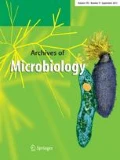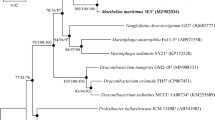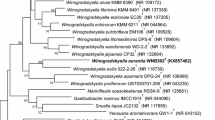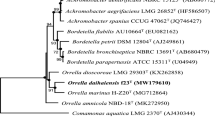Abstract
A Gram-stain-negative, rod-shaped (0.3–0.6 × 0.9–2.2 µm), facultatively aerobic, non-motile and yellow-coloured bacterium, designated strain F6397T, was isolated from a marine sediment in Weihai, PR China. Growth of strain F6397T occurred at 4–37 °C (optimum, 30–33 °C), pH 6.0–9.0 (optimum, 7.5) and in the presence of 1–12% (optimum, 3.0%) (w/v) NaCl. Strain F6397T showed oxidase- and catalase-positive activities. Phylogenetic analyses based on the 16S rRNA gene sequence revealed that the strain was assigned to the genus Winogradskyella. Strain F6397T exhibited 95.5–98.1% sequence similarities to recognized species of the genus Winogradskyella. The average nucleotide identity (ANI) scores with Winogradskyella ludwigii HL116T, Winogradskyella litoriviva KMM 6491 T and Winogradskyella thalassocola KMM 3907 T were 80.1, 78.9 and 82.6%, respectively. The digital DNA–DNA hybridization (dDDH) scores were 23.5, 22.9 and 25.7%, respectively. The genomic DNA G + C content was 33.5 mol%. Strain F6397T contained iso-C15:0, iso-C15:1G, iso-C15:0 3-OH and iso-C17:0 3-OH as the predominant fatty acid and MK-6 as the predominant menaquinone. The polar lipid profiles contained phosphatidylethanolamine, three unidentified aminolipids and four unidentified lipids. On the basis of the evidence presented in this study, strain F6397T is considered to represent a novel species of the genus Winogradskyella, for which the name Winogradskyella marina sp. nov. is proposed. The type strain is F6397T (= KCTC 82422 T = MCCC 1H00438T).

Similar content being viewed by others
Data availability
The GenBank accession number for the 16S rRNA gene sequence and Whole Genome Shotgun project of strain F6397T are MW422811 and JADOET000000000, respectively.
Abbreviations
- MCCC:
-
Marine Culture Collection of China
- KCTC:
-
The Korean Collection for Type Cultures
- ANI:
-
Average nucleotide identity
- GGDC:
-
Genome-to-genome distance calculator
- dDDH:
-
Digital DNA–DNA hybridization
- MEGA:
-
Molecular evolutionary genetics analysis
- MIDI:
-
Microbial identification system
- HPLC:
-
High-performance liquid chromatography
- TLC:
-
Thin-layer chromatography
- PG:
-
Phosphatidylglycerol
- PE:
-
Phosphatidylethanolamine
- PC:
-
Phosphatidylcholine
- DPG:
-
Diphosphatidylglycerol
- MA:
-
Marine agar 2216
- MB:
-
Marine broth 2216
References
Akira et al (1996) Comparative lipoquinone analysis of influent sewage and activated sludge by high-performance liquid chromatography and photodiode array detection. J Gen Appl Microbiol 42:457–469
Aziz RK et al (2008) The RAST Server: rapid annotations using subsystems technology. BMC Genomics 9:75. https://doi.org/10.1186/1471-2164-9-75
Bernardet JF, Nakagawa Y, Holmes B, Subcommittee On The Taxonomy Of F, Cytophaga-Like Bacteria Of The International Committee On Systematics Of P (2002) Proposed minimal standards for describing new taxa of the family Flavobacteriaceae and emended description of the family. Int J Syst Evol Microbiol 52:1049–1070. https://doi.org/10.1099/00207713-52-3-1049
Bowman JP (2000) Description of Cellulophaga algicola sp. nov., isolated from the surfaces of Antarctic algae, and reclassification of Cytophaga uliginosa (ZoBell and Upham 1944) Reichenbach 1989 as Cellulophaga uliginosa comb. Nov. Int J Syst Evol Microbiol 50(Pt 5):1861–1868. https://doi.org/10.1099/00207713-50-5-1861
Collins MD, Goodfellow M, Minnikin DE (1980) Fatty acid, isoprenoid quinone and polar lipid composition in the classification of Curtobacterium and related taxa. J Gen Microbiol 118:29–37. https://doi.org/10.1099/00221287-118-1-29
Du ZJ, Wang Y, Dunlap C, Rooney AP, Chen GJ (2014) Draconibacterium orientale gen. nov., sp. nov., isolated from two distinct marine environments, and proposal of Draconibacteriaceae fam. nov. Int J Syst Evol Microbiol 64:1690–1696. https://doi.org/10.1099/ijs.0.056812-0
Eder K (1995) Gas chromatographic analysis of fatty acid methyl esters. J Chromatogr B Biomed Sci Appl 671:113–131. https://doi.org/10.1016/0378-4347(95)00142-6
Gerhardt P, Murray RGE, Wood W, Krieg N (1994) Methods for general and molecular bacteriology. American Society for Microbiology
Ivanova EP et al (2010) Winogradskyella exilis sp. nov., isolated from the starfish Stellaster equestris, and emended description of the genus Winogradskyella. Int J Syst Evol Microbiol 60:1577–1580. https://doi.org/10.1099/ijs.0.012476-0
Kanehisa M, Sato Y, Morishima K (2016) BlastKOALA and GhostKOALA: KEGG tools for functional characterization of genome and metagenome sequences. J Mol Biol 428:726–731. https://doi.org/10.1016/j.jmb.2015.11.006
Kimura M (1980) A simple method for estimating evolutionary rates of base substitutions through comparative studies of nucleotide sequences. J Mol Evol 16:111–120. https://doi.org/10.1007/bf01731581
Kumar S, Stecher G, Tamura K (2016) MEGA7: molecular evolutionary genetics analysis version 7.0 for bigger datasets. Mol Biol Evol 33:1870–1874. https://doi.org/10.1093/molbev/msw054
Li R et al (2010) De novo assembly of human genomes with massively parallel short read sequencing. Genome Res 20:265–272. https://doi.org/10.1101/gr.097261.109
Liu QQ, Wang Y, Li J, Du ZJ, Chen GJ (2014) Saccharicrinis carchari sp. nov., isolated from a shark, and emended descriptions of the genus Saccharicrinis and Saccharicrinis fermentans. Int J Syst Evol Microbiol 64:2204–2209. https://doi.org/10.1099/ijs.0.061986-0
Meier-Kolthoff JP, Auch AF, Klenk HP, Göker M (2013) Genome sequence-based species delimitation with confidence intervals and improved distance functions. BMC Bioinformatics 14:60. https://doi.org/10.1186/1471-2105-14-60
Minnikin DE et al (1984) An integrated procedure for the extraction of bacterial isoprenoid quinones and polar lipids. J Microbiol Methods 2:233–241
Nedashkovskaya OI et al (2005) Winogradskyella thalassocola gen. nov., sp. nov., Winogradskyella epiphytica sp. nov. and Winogradskyella eximia sp. nov., marine bacteria of the family Flavobacteriaceae. Int J Syst Evol Microbiol 55:49–55. https://doi.org/10.1099/ijs.0.63307-0
Nedashkovskaya OI, Kukhlevskiy AD, Zhukova NV, Kim SJ, Rhee SK, Mikhailov VV (2015) Winogradskyella litoriviva sp. nov., isolated from coastal seawater. Int J Syst Evol Microbiol 65:3652–3657. https://doi.org/10.1099/ijsem.0.000470
Richter M, Rosselló-Móra R (2009) Shifting the genomic gold standard for the prokaryotic species definition. Proc Natl Acad Sci U S A 106:19126–19131. https://doi.org/10.1073/pnas.0906412106
Sasser M (1990) Identification of bacteria by gas chromatography of cellular fatty acids. USFCC Newsl 20:1–6
Smibert RM, Krieg NR (1994) Phenotypic characterization. In: Methods for general and molecular bacteriology. American Society For Microbiology:611–651
Vaskovsky VE, Kostetsky EY (1968) Modified spray for the detection of phospholipids on thin-layer chromatograms. J Lipid Res 9:396
Acknowledgements
The scanning electron microscopy was supported by the Physical Chemical Materials Analytical and Testing Center of Shandong University at Weihai.
Funding
None.
Author information
Authors and Affiliations
Contributions
Strain F6397T was isolated by J-SB. Material preparation, experimental operation, data collection and analysis were performed by J-SB, X-ZS and SW. The manuscript was written by J-SB. Project guidance and critical revision of manuscripts was performed by Z-JD. All authors read and approved the final manuscript.
Corresponding author
Ethics declarations
Conflict of interests
The authors declare that there is no conflict of interest.
Additional information
Communicated by Erko Stackebrandt.
Publisher's Note
Springer Nature remains neutral with regard to jurisdictional claims in published maps and institutional affiliations.
Supplementary Information
Below is the link to the electronic supplementary material.
Rights and permissions
About this article
Cite this article
Bo, J., Song, X., Wang, S. et al. Winogradskyella marina sp. nov., isolated from marine sediment. Arch Microbiol 203, 5381–5386 (2021). https://doi.org/10.1007/s00203-021-02517-x
Received:
Revised:
Accepted:
Published:
Issue Date:
DOI: https://doi.org/10.1007/s00203-021-02517-x




